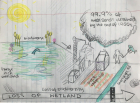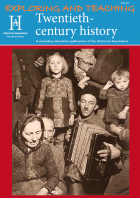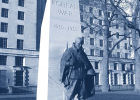World 1901-present
Some of the most profound and influential changes in world history take place from 1901 to today and covered here are many of the important and well known ones as well as some of the smaller stories. In terms of reach this section covers huge themes on diplomacy, post imperialism and economics. The articles cover the time period right up into recent events such as the State of the Union address by the US President Barrack Obama.
Sort by:
Date (Newest first) | Title A-Z
Show:
All |
Articles |
Podcasts |
Multipage Articles
-

Cunning Plan 143: enquiries about the British empire
ArticleClick to view -

Cunning Plan 97: A-Level: International Relations 1890-1914
ArticleClick to view -

Cunning Plan 99: 'a world study after 1900'
ArticleClick to view -

Decolonise, don’t diversify: enabling a paradigm shift in the KS3 history curriculum
ArticleClick to view -

Developing transferable knowledge at A-level
ArticleClick to view -

Establishing a dialogue with Year 9 about why environmental history matters
ArticleClick to view -

Exploring and Teaching Twentieth-Century History
ArticleClick to view -

Exploring and Teaching the Korean War
Multipage ArticleClick to view -

Film series: Power and authority in Russia and the Soviet Union
13th August 2024Click to view -

Film series: The African-American Civil Rights Movement
ArticleClick to view -

Film: Brezhnev's early life and career
ArticleClick to view -

Film: China's Good War
ArticleClick to view -

Film: Lenin's early thought
ArticleClick to view -

Film: Rethinking the origins of the Cold War
ArticleClick to view -

Film: Stalin - Early Life
ArticleClick to view -

Film: The Kennedys and the Gores
ArticleClick to view -

Film: Why does the massacre of the Armenians in the First World War still get overlooked?
ArticleClick to view -

Films: Boris Yeltsin – Interpretations
19th June 2024Click to view -

Films: Khrushchev – Interpretations
9th October 2024Click to view -

Films: Mikhail Gorbachev – Interpretations
ArticleClick to view

